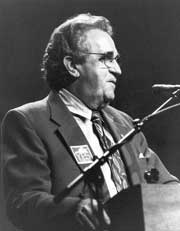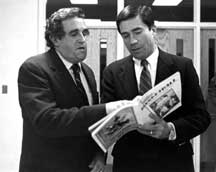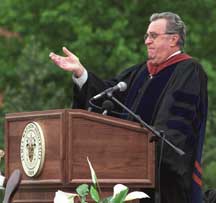
During his 27 years as president of Madison College and James Madison University, Dr. Ronald E. Carrier became something of a legend in political and educational circles for his funny stories and quick wit.
He was in high demand as a speaker for high school and college commencements as well as for civic clubs and other organizations around the state. It wasn't unusual for him to deliver three or more speeches in the same week in different parts of the state.
State politicians in Richmond were always glad when Dr. Carrier appeared and lightened up their often dull and ponderous committee meetings and hearings.
Here is a sampling of some of the Carrier humor:
Dr. Carrier was in Richmond appearing before the Capital Outlay Subcommittee of the House Appropriations Committee, making a plea for some funding to construct a new building on campus. Receiving significant state funding without the blessing of the powerful committee was virtually impossible.
The subcommittee was headed by the influential delegate from Winchester, Alson H. “Al” Smith. Smith was the key to funding on the subcommittee.
Dr. Carrier was making his plea for funds for a building when Delegate Smith interrupted him: “President Carrier, as I recall, you appeared before this committee last session and said if we gave you money for a building then, you'd never ask for anything again. We gave you the funds and here you are back again asking for more. Can you explain that?”
Dr. Carrier didn't blink but quickly responded, cracking up the committee and Delegate Smith: “I lied.”
# # #

On another occasion at the State Capitol, Dr. Carrier was accompanied by his executive assistant and future successor as JMU president, Dr. Linwood H. Rose.
One by one, members of the House of Delegates and State Senate greeted Dr. Carrier warmly and came up to strike up a friendly conversation.
“They sure do like you,” Dr. Rose told the president.
At that time, some Virginia presidents could call on their influential alumni in the General Assembly or in key business and governmental jobs to place pressure on legislators to get a bill passed. However, JMU then had few, if any, alumni in key political positions.
“There's no reason they wouldn't like me,” Dr. Carrier replied. “They know I can't hurt them.”
# # #
Lou Frye, long-time physical plant supervisor at Madison, was knee deep in wet concrete pouring a footer for the new Madison Stadium (now Bridgeforth Stadium). There was a big rush to get the job done so that the stadium would be available for the opening game of the new season. Dr. Carrier, standing on higher ground above Lou, said: “Lou, you have to hurry and finish this job.” Frye responded: “Dr. Carrier, you know Rome wasn't built in a day!” Dr. Carrier immediately said: “Lou, I wasn't in charge.”
# # #
At a graduation on the JMU Quadrangle, Dr. Carrier relayed this story to the huge audience about a conversation he'd had before the ceremony:
“Just before the processional, a lady came up to me and said ‘Dr. Carrier, the campus is beautiful. You and the Lord have done a magnificent job.'
“I told her she should have seen the campus when the Lord had it by Himself.”
# # #
When Dr. Carrier arrived as president, the campus of Madison College was pretty drab and brown.
Before the Carrier administration, the tradition had been basically to leave the campus alone and let the grass die when there was dry weather. The new president set out to change that attitude, ordering additional seeding of the campus and the planting of many trees, flowers and shrubs.
Not all of his staff got the message immediately.
Dr. Carrier was with one of the top buildings and grounds officials and told him to make sure that the grass on the Quadrangle received a good watering.
“Are you sure you want us to do that, Dr. Carrier?” he said. “It will just make the grass grow faster and we'll have to cut it.”
Propriety does not allow the president's comments to be repeated. Suffice it to say that the message took.
# # #
In the 1980s, Dr. Carrier publicly announced that JMU's new goal was to “become the finest public undergraduate university in America.”
Some questioned why he would take on such an ambitious goal.
His response was “I figured trying to be the best public undergraduate university was a better goal than trying to be the third best or eighth best.”
# # #
Dr. Carrier occasionally forgot or mangled other people's names. His tops aides learned quickly to whisper the names of people in his ear. There wasn't always someone there to help.
At a meeting at the beginning of the school year in 1975, Dr. Carrier was introducing a new member of the administration, a man who would later succeed him as president, Dr. Linwood H. Rose.
He told the audience: “I'd like to welcome a new member to our administrative team, Lin Wood.”
# # #
Returning one day from visiting a country fair in a rough-and-tumble part of the state, Dr. Carrier told his staff: “Gentlemen, there are more of them than there are of us.”
# # #
One sunny afternoon in the late 1970s, a Madison alumna was visiting campus for the first time since she graduated many, many years before.
She was flabbergasted by the changes she saw in her alma mater: the presence of men, all those new buildings, a football team, and – my, my – look what the students are wearing these days.
The alumna figured, however, there had to be a semblance of consistency in the midst of all this change. When she met President Ronald E. Carrier, she asked: “Tell me, Dr. Carrier, are the girls still required to wear hose for the evening meal?”
“Not really,” the president answered, “we're lucky to get them to wear shoes.”
# # #
A number of years ago, the presidents of Virginia public colleges and universities were summonsed to Richmond by the Governor, who was often at odds with the leaders of public higher education.
The Governor had announced that he wanted to have a dialogue with the college presidents. The meeting consisted of the Governor coming into the room and berating the presidents for ten minutes and then walking out.
Dr. Carrier turned to one of his fellow college presidents and said: “This was supposed to be a ‘dialogue,' but it seems like the Governor was the only one doing any dialoguing.”
# # #
One of Dr. Carrier's vice presidents was an ordained minister and a confirmed teetotaler.
The vice president's office was connected by a door to Dr. Carrier's conference room. One night, the president sneaked into vice president's office and left an empty bottle of Jack Daniels in one of the drawers.
The next morning at a meeting of the President's Staff, the vice president gravely announced that someone had left a bottle of “Fred Daniels” in his desk drawer.
# # #

Dr. Carrier was an extremely popular guest speaker for many clubs and organizations. One of the reasons for his popularity was that he mixed a serious message with a good measure of humor.
Some of his more memorable one-liners include:
• “I was the tenth of eleven children. My parents weren't Catholic; they were just enthusiastic.”
• “I grew up in a large family in rural East Tennessee. I never slept alone until I was married.”
• “At the last speech I gave, I asked if everyone could hear me all right. A man in the back row said he couldn't hear. A man in the front row yelled: ‘Come on up here. I can hear fine and you can have my seat.' ”
